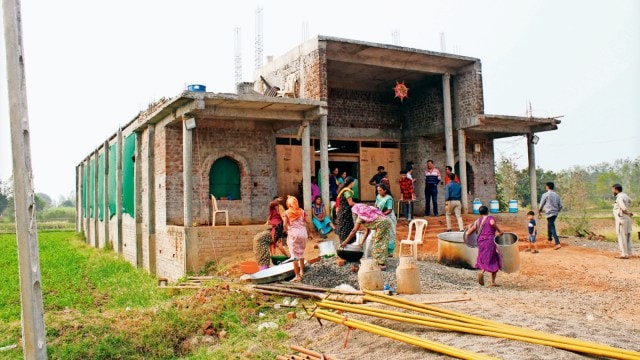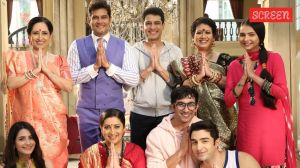In the backdrop of protests against Christian events, a Tapi village celebrates a quiet Christmas
Seated on the floor, the guests were served their meal in steel dishes usually reserved for special occasions. After the lunch, the attendees exchanged Christmas wishes and dispersed.
 Outside a church in Pipalkuva village. (Hanif Malek)
Outside a church in Pipalkuva village. (Hanif Malek)On Wednesday afternoon, residents of Pipalkuva gathered at the ‘Vijaybhai Church’, the most prominent church in this village in Tapi district, for mass. This was followed by a community lunch of chicken curry and chapatis. Before that, kaju katli and other local sweets bought from Songadh town were served, in the true Gujarati tradition where the sweets are had before the savoury items.
Seated on the floor, the guests were served their meal in steel dishes usually reserved for special occasions. After the lunch, the attendees exchanged Christmas wishes and dispersed.
The understated scene outside the church reflects the mood across the village, which bears almost no sign of festivity — no colourful lights adorn the houses, the star of Bethlehem is conspicuous by its absence. The village has 3,000 residents, of which 95% are practising Protestant Christians, according to the community leaders. This, the low-key celebrations, was not always the case.
“A couple of years ago, Christmas would be celebrated in open spaces in the village grounds,” says 30-year-old Samuel Gamit, son of Pastor Vijay Gamit after whom the church is named.
The decision by village elders to not draw attention to Christmas celebrations is not without reason.
Since February, a self-styled organisation that goes by the name of Dev Birsa Munda Sena (DBMS) has been objecting to congregations in the district, alleging they were being used to convert the tribals. On December 23, two Christian leaders were arrested for allegedly threatening the Tapi district president of the Sena, Jignesh Gamit — a tribal.
 Samuel, who looks after the administration of over 70 churches in South Gujarat, says the Sena has handed several memoranda to the Tapi District Collector objecting to their religious meetings.
Samuel, who looks after the administration of over 70 churches in South Gujarat, says the Sena has handed several memoranda to the Tapi District Collector objecting to their religious meetings.
The outfit has not made an exception for even an elected MLA of the state’s ruling Bharatiya Janata Party (BJP). On November 20, DBMS members tried to burn the effigy of Mohan Kokni outside the District Collectorate after he addressed a Christian congregation. He is the first Christian tribal person from the BJP to have been elected as an MLA from the Scheduled Tribe (ST) reserved constituency of Vyara. Held earlier by Congress’s Punaji Gamit, who was also a Christian, it is the only seat in Gujarat with a Christian MLA.
Samuel, who looks after the administration of over 70 churches in South Gujarat, says the Sena has handed several memoranda to the Tapi District Collector objecting to their religious meetings.
Pipalkuva is an interior village of Songadh taluka with a bitumen road leading to six different streets. A majority of residences in the village, which is home to five churches, are pucca houses.
Kalpesh Gamit, 25, who volunteered at the Christmas lunch, tells The Indian Express, “Majority of the youths in our village are studying in colleges… A number of villagers are in government jobs: police department, hospitals, etc. Parents here give more importance to education than having their children assist them in farming.”Kalpesh recalls how bands would “play music in the open where people would dance”, during Christmas a few years ago. “This year, we were told (by the elders) to celebrate on the church campus…This is because of the recent protests…”
At Samuel’s spacious home, a huge photograph of Pastor Vijay adorns the drawing room. A second-generation Christian from the village, he was a government employee who died in 1998. Samuel’s sisters Rita, Kalpana and Gracy, who reside in different parts of Tapi district, came with their husbands to spend Christmas with their mother and brother.
Samuel says, “This year, we are celebrating the festival indoors — in the churches and prayer halls. We have come across some anti-social elements who are opposing Christian community gatherings.”
According to Samuel, the police have also delayed issuing permissions to the celebration. “If we don’t take permission and somebody tips off the police, our event gets disrupted,” he tells The Indian Express.
Songadh police inspector K D Mandora says that the permission entails a “lengthy process”: the venue for every event has to be verified to see if it is privately owned or is situated on forest land. “We send the application to the mamlatdar to see other parameters and later decide whether to give permission or not. Generally, from our side, we keep in mind law and order issues,” he adds.
Just a few meters away from Samuel’s house lives Gurji Gamit, 79. He recalls how Samuel’s great grandfather Relia Gamit was among the first to convert to Christianity in the village. “He came in contact with missionaries in Vyara and set up the first prayer hall of Songadh taluka in Pipalkuva in an open place just beside his house. Slowly, he began preaching to villagers who were addicted to liquor and tobacco. Several houses in our village brewed liquor and sold it for a living at that time,” he says.
“Those who want to consume tobacco now have to travel at least 10 kilometres to get it!” says provision shop owner Jitendra Gamit, 40. Gurji says the first church in the village was built by Khalpa Gamit, Pastor Vijay’s father, in 1965. “After his death, the church named after Vijaybhai was built. This family is highly respected in our village as well as neighbouring villages,” he adds.
According to Gurji, although MLA Kokni attends several community meetings, “he has never uttered a single word against the DBMS. We think that he would be under pressure…”
Kokni did not take calls from this paper or respond to text messages.
Till 2020, Jignesh, a resident of Khogal village in Songadh taluka, was with the Hindu Jagran Manch, a right-wing organisation, which he quit to set up DBMS along with Arvind Vasava in February 2024. Arvind proclaimed himself as the national president and claimed the outfit’s purpose was to “save and protect tribal culture”.
The DBMS protested against Kokni’s participation in a three-day event of ‘Christi Atmik Sammelan 2024’ on November 18 organised by Faith Fellowship Church in Chikhalvav village where the Sena volunteers were detained. A month later, on December 20, Jignesh lodged a complaint against two Christian men alleging they threatened him. Police arrested Rakesh Gamit and Ramesh Gamit on December 23; they were released on bail the same day.
“The tribals are Hindus. The missionaries had been working in our tribal-dominated district for the last 30 to 35 years and got many tribals converted to Christianity…The tribals get benefits due to Schedule Tribes status, like (reservation) in education, government jobs, but they follow Christianity. On government records, they show themselves as ‘Tribal-Hindu’. They follow Christianity so they should not get (reservation) benefits,” said Jignesh.
Gracy, Samuel’s sister, says, “My brother and my two elder sisters had Tribal Hindu mentioned in their school leaving certificates (SLC) while my father had mentioned my religion as Christian. My sisters and brother got all scholarships and benefits as Tribal Hindu, which I did not get.”In August this year, Dipak Gamit, a Christian leader from Tapi district, had got a court order in his favour to change “Hindu Tribal” to “Schedule Tribe” in the religion column of his SLC. He claimed that the DBMS opposed the Christian events in Ukai, Vyara and Songadh talukas for this very reason. “Else, the villagers should proudly identify themselves as Christians,” he says.
National president of the Samast Christi Samaj, Haresh Gamit, says that members of the Christian community in Tapi had submitted a memorandum with the police on December 12, requesting to allow them to celebrate their festival till New Year “in peace”.
At his home in Pipalkuva, Samuel vehemently dismisses the allegations of DBMS leaders. “I can assure you that no such religious conversion is done in any of the community gatherings. We are open and have invited them to attend our event. They are very few in numbers and want fame and popularity. They are creating disturbances.”












